Tote bags vs. plastic bags, and the overall impact of consumer plastic use
In response to my post on the effects of plastic bag bans (Edit: which addresses various different types of environmental impact, like pollution), reader Veronica Skowronski pointed me at this Atlantic article on whether tote bags are good for the environment (Edit: which is focused on energy consumption in particular). The article cites various evidence that reusable grocery tote bags often don’t get reused enough to save more resources than they consume — especially the fancier ones that have gotten popular recently.  In fact, tote bags have gotten more ubiquitous, to the point that people are accumulating and even throwing them away, but polls show they’re very rarely used.  And plastic bags do actually have the smallest footprint to produce and distribute — compared to paper or various tote materials — even though they’re slowest to biodegrade.  The article’s conclusion?
So long as their owners don’t throw them away, [tote bags’] negative impact remains minimized, at least—they might yet be used 327 times. Ecologically speaking, the best practice for tote bags might be one of two extremes: use them all the time, or not at all.
I personally don’t ever invest in buying new totes… I carry around a bunch of tote bags in my trunk that I got at conferences, conventions, or other events where they were giving them away free — they were generally not intended for groceries (and say a funny assortment of things like Grace Hopper, NSF, or Sherlock Seattle :) ), but they serve that purpose fine. I realize this is not an option all shoppers will have access to, but it’s a thought for those of you with spare totes sitting around from similar events.
The Atlantic article also points out that this is far from the only case where the desired goal of helping the environment leads people to do things that are actually less effective — or where people analyze only the small picture and not the whole ecosystem:
This low-grade, unfocused mania for averting impending ecological disaster seems to be more harmful than helpful, which is a problem throughout popular environmentalism. Meat eaters decry the water usage demands of almond groves. Conscientiously piled garbage overflows from public trashcans to rot in the street. Studies show that Kenya-grown roses flown to England have a lower carbon footprint than those grown and shipped from Holland, that it’s less ecologically damaging for Americans east of the Mississippi to import wine from France than from California. Biodegradable plastics proliferate as single-use containers and utensils, greenly filling the demand for disposable goods rather than questioning it. Fuel economy and emissions standards for cars and trucks are considered, barely, but not those of oil tankers, container ships, military escapades, which can produce tens of millions of times the amount of carbon.
With that in mind, I wondered whether or not consumer plastic use (including plastic bags) actually constitutes a very large portion of plastic use overall.  Maybe corporate plastic (re)use renders individual actions relatively small impact?
However, Â I took a quick peek at some data that seems to indicate otherwise. Â Looking at European plastic data (which was easiest to find), it appears that packaging — which I believe includes plastic bags — is the largest market sector, with household use over twice the rate of commercial and industrial use:
Sources: Plastics Europe, 2014; Plastics recycling: challenges and opportunities, Hopewell et al, 2009
So yes, our individual choices around plastic reuse and recycling could potentially (in aggregate) have substantial impact on plastic waste overall, although I don’t know how big a chunk of this is plastic bags specifically (I suspect a smallish percentage, just because there is so much plastic packaging out there, and most of it is a lot bulkier than the bags).
It looks like — in Europe, anyway –Â less plastic is ending up in the landfill (or, the oceans…? not sure if/how litter was counted) over time:
Source: Plastics Europe, 2014 — note that plastics manufacturers wrote this and I haven’t fact checked it
It also looks like one of the most effective ways to encourage plastic recycling is to implement a national ban on plastic in landfills:
(Same source)
Note that some of what is not recycled can’t be recycled (wrong type of plastic).  But it looks like they’re achieving ~25-30% recycling rates in some countries.  However, it appears in the US that we have a lot of room for improvement, as the plastic recovery rate (which includes recycling and energy recovery — combustion with energy recapture) is 8.8% overall, and 10-20% for the most easily recyclable types of plastic:
Source, EPA, 2015
With the caveat that these numbers are not necessarily directly comparable with the European ones above, as they may have somewhat different methodologies, it appears as if European countries in general are doing a better job on average of keeping plastic out of landfills (through recycling and/or energy recovery) than the US.  Much of that seems to be through regulation, though I didn’t dig further to see how if I could find stats on how much impact consumer recycling has.
Anyway, takeway for now: plastic bags are actually better for the environment than some options, including tote bags, unless you actually reuse tote bags — or paper bags — a bunch.  But it’s also worth trying to reuse/recycle plastic when possible, because consumer plastic use is actually a large portion of plastic use overall.
Edit, taken from my comment below: I think most of my blog readers probably have the resources to conscientiously reuse cotton/other biodegradable bags, or to avoid bags when possible, and should do so [because of the risk of plastic bag litter on land and at sea]. However, this still leaves a ton of potential plastic usage in other areas — plastic containers, trash bags, pet litter bags, etc). But we have a big enough impact as consumers that it is worth acting on an individual level, rather than just lobbying for industry regulations.

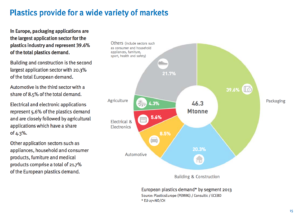
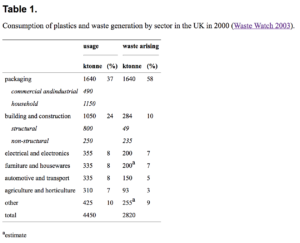
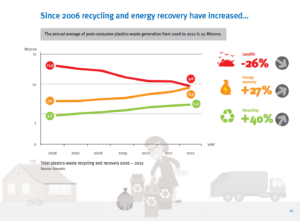
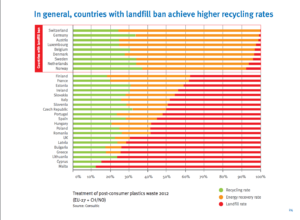
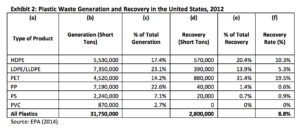
Jade Said,
December 19, 2016 @ 7:38 am
So the Atlantic article does a good job summarizing the cost of producing the bags, but seems to completely avoid the topic of biodegradability or cost to the environment of having the plastic in the environment. Cotton totes may produce a lot of carbon waste, but they biodegrade, and they don’t end up in giant piles of waste in the oceans, killing sea turtles and turning into microbeads and poisoning our water. I think a real comparison between plastic bags and reusable totes must take that cost into account. It’s difficult to put a number on it, but ignoring it seems like it falsely biases things towards plastic bags.
Your calculations of what % ends up in landfills is a good start on this, but even with 60% of the bags ending up in landfills, that still seems like a huge cost to the environment. I would also be interested in hearing about the effectiveness of plastic shopping bag recycling – I recycle the ones I end up with but I always worry whether it actually helps or not. Also note that household use includes trash bags as well as grocery bags – we go through 3 bags each week just throwing out trash. It seems like a lot. :-( But while I have a alternative for grocery bags, I don’t feel like I have any alternative for trash bags.
lauren Said,
December 21, 2016 @ 11:28 am
Yeah, I did try to address the (very important!) impact on how many bags end up in the water in my last post (linked at the top), but you’re not the only person to say this, so I should make that clearer. In any case, all my posts end up being a bit apples to oranges as I try to track down relevant data on various types of impact, weigh them against each other, and often end up with unclear takeaways. :-/ But in this case, I think most of my blog readers probably have the resources to conscientiously reuse cotton/other biodegradable bags, or to avoid bags when possible, and should do so. However, this still leaves a ton of potential plastic usage in other areas — plastic containers, trash bags, pet litter bags, etc). But we have a big enough impact as consumers that it is worth acting on an individual level, rather than just lobbying for industry regulations.